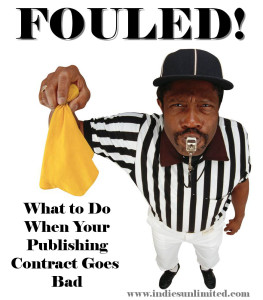 By Lynne Cantwell
By Lynne Cantwell
March is long since over, so I bet you thought it was safe, didn’t you? After reading so many of our #PublishingFoul horror stories last month, you dug yourself a hole and vowed not to come out of it until April rolled around. Right?
Yeah, well, unfortunately, scammers don’t limit their activities to a single month. So the admins asked me to do a wrap-up post with links to all the information we shared with you last month. That way, we’ve got it all in once place. We’re hoping it will be a nifty resource.
Vanity press predators: Yvonne Hertzberger told us about her experience with iUniverse. Melissa Bowersock, Brenda Perlin, and Dan Peyton told us about their not-very-wonderful experiences with PublishAmerica (which is now America Star Books), and Jacqueline Hopkins explained how she helped a friend escape their clutches.
To be fair, not every has a bad experience with a vanity press. Melissa Bowersock told us about how one vanity press published a book she believed in but no traditional publisher would take.
Small press problems: Sometimes the questionable publisher is a small operator. Kathy Rowe told us about her experience with Black Rose Writing. TD McKinnon shared his horror story about Pen Press Publishers Pty Ltd. S.R. Claridge talked about her ordeal with Vanilla Heart Publishing. And an anonymous contributor told us about the small press Ponzi scheme she found herself involved in.
Scammy editors: Brenda Perlin told us about her awful experience with FirstEditing.
Avoiding scammers: David Gaughran provided a us with a list of five ways to avoid publishing predators. Melinda Clayton gave us a list of things to investigate when deciding whether to sign a dicey-looking contract. And Sophie Jonas-Hill had a top-ten list of ways to tell you’re about to be scammed.
FOULED!: I offered up a four-part series, starting off with why it’s unfair to blame the victims, and moving on to what to do if you find yourself hooked by a scammer: how to get your editor to edit, how to get your rights back, and, if all else fails, whether it’s worth it to sue.
S.R. Claridge went further in-depth on the legal angle, explaining the types of charges you might be able to bring against a predatory publisher.
RJ Crayton looked into why some authors who have had a horrible experience with a scammer might still recommend the outfit. Stockholm Syndrome, maybe?
And our #PublishingFoul survey yielded some very interesting numbers about the extent of the problem.
After the month was over, we sent out a press release about the survey results. And we got some very nice coverage [link] around the web out of it.
In addition to all of that, we also pulled together some resource pages:
The scammers aren’t done, so we’ll be revisiting the #PublishingFoul topic from time to time. But you won’t need your hidey-hole anymore, because now that you have all of our coverage at your fingertips, you’re armed against the predators.
Please share our news release or at least some of these articles so we can spread the word and educate unsuspecting authors. And, if you know of a scammer or have a story to tell, please contact us.

6 thoughts on “Resource: Predatory Publishers Recap”
Comments are closed.